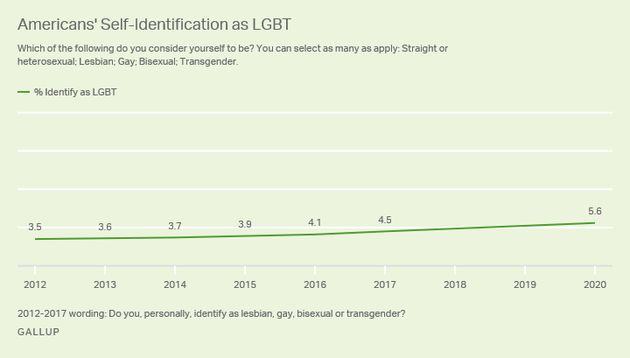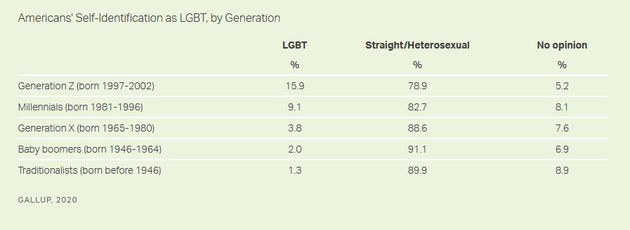According to a Gallup survey, 15,9% of Americans aged 19-24 identify themselves as LGBT. The poll also shows that among the general population, the figure reaches a record high (5,6%).
![Photo: [link]Mercedes Mehling[/link], Unsplash CC0.](https://cms.evangelicalfocus.com/upload/imagenes/603918aeb9ec4_mercedesmehling940.jpg) Photo: [link]Mercedes Mehling[/link], Unsplash CC0.
Photo: [link]Mercedes Mehling[/link], Unsplash CC0.
A new survey recently released by Gallup has found that more American adults identify as gay, lesbian, bisexual or transgender than ever before.
According to Gallup, “5.6% of U.S. adults identify as LGBT. The current estimate is up from 4.5% in our previous update based on 2017 data”. In 2012, when Gallup began tracking this issue, it was 3.5%.
The survey shows that 86.7% of Americans say they are heterosexual, and 7.6% do not answer the question about their sexual orientation.
“The identity question asked in 2020 offers a greater level of detail than the question asked in previous years. Now, respondents indicate their precise sexual orientation, rather than simply answering yes or no to whether they identify as lesbian, gay, bisexual or transgender”, explain the authors of the poll.
Among LGBT adults, more than half (54.6%) say they are bisexual, while 24.5% identify as gay, 11.7% as lesbian and 11.3% as transgender. An additional 3.3% used a different non-heterosexual term to describe their orientation. “Respondents can give multiple responses; thus, the totals exceed 100%”, says Gallup.
“Rebasing these percentages to represent their share of the U.S. adult population finds 3.1% of Americans identifying as bisexual, 1.4% as gay, 0.7% as lesbian and 0.6% as transgender”, underlines the survey.

Furthermore, the poll finds that the generational group that has the highest percentage of people who identify as LGBT is Generation Z (1997-2012) with 15.9%.
According to Gallup, “one of the main reasons LGBT identification has been increasing over time is that younger generations are far more likely to consider themselves to be something other than heterosexual”.
Generation Z is followed by Millennials (born 1981-1996) with 9.1%, 3.8% of Generation X (born 1965-1980), 2% of Baby Boomers (born 1946-1964) and 1.3% of Traditionalists (born before 1946) identifying as LGBT.
Most of the LGBT Generation Z adults say they are bisexual (72%), “thus, 11.5% of all Gen Z adults in the U.S. say they are bisexual, with about 2% each identifying as gay, lesbian or transgender”, points out Gallup.
Meanwhile, “about half of millennials who identify as LGBT say they are bisexual. In older age groups, expressed bisexual preference is not significantly more common than expressed gay or lesbian preference”, they add.
“The pronounced generational differences raise questions about whether higher LGBT identification in younger than older Americans reflects a true shift in sexual orientation, or if it merely reflects a greater willingness of younger people to identify as LGBT”, the survey stresses.

Regarding sex, the survey shows that women are more likely than men to identify as LGBT (6.4% vs. 4.9%, respectively) and as bisexual (4.3% vs 1.8%).
There are differences depending on the political ideology of the respondents,with 13.0% of political liberals, 4.4% of moderates and 2.3% of conservatives saying they are lesbian, gay, bisexual or transgender.
“Differences are somewhat less pronounced by party identification than by ideology, with 8.8% of Democrats, 6.5% of independents and 1.7% of Republicans identifying as LGBT”.
However, “there are no meaningful educational differences: 5.6% of college graduates and 5.7% of college non-graduates are LGBT.
Gallup conducted over 15,300 interviews throughout 2020 with Americans aged 18 and older.
“To the extent it reflects older Americans not wanting to acknowledge an LGBT orientation, the Gallup estimates may underestimate the actual population prevalence of it”, they admit.
The authors of the survey conclude that “at a time when Americans are increasingly supportive of equal rights for gay, lesbian and transgender people, a growing percentage of Americans identify themselves as LGBT. With younger generations far more likely than older generations to consider themselves LGBT, that growth should continue”.

Las opiniones vertidas por nuestros colaboradores se realizan a nivel personal, pudiendo coincidir o no con la postura de la dirección de Protestante Digital.
Si quieres comentar o